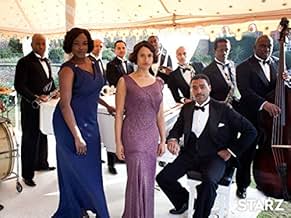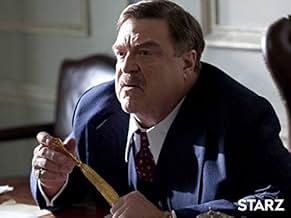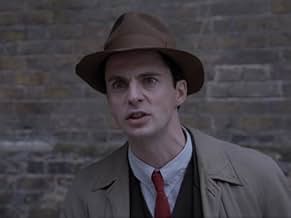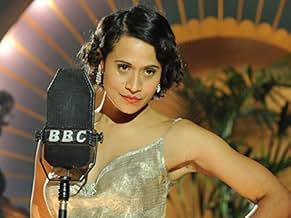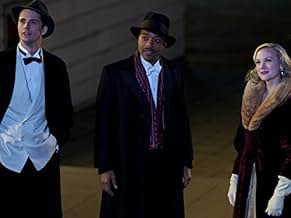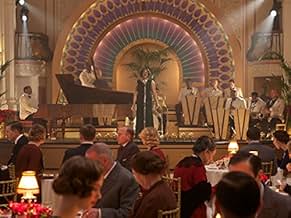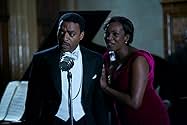NOTE IMDb
7,4/10
2,9 k
MA NOTE
Ajouter une intrigue dans votre langueSet in the 1930s, a black Jazz band rises in fame and popularity while becoming entangled in an intricate web of intrigue, mystery and suspense with the elite of London society.Set in the 1930s, a black Jazz band rises in fame and popularity while becoming entangled in an intricate web of intrigue, mystery and suspense with the elite of London society.Set in the 1930s, a black Jazz band rises in fame and popularity while becoming entangled in an intricate web of intrigue, mystery and suspense with the elite of London society.
- Nommé pour 1 Primetime Emmy
- 5 victoires et 16 nominations au total
Parcourir les épisodes
Avis à la une
This television series from the celebrated Stephen Poliakoff portrays 1930s upper class London but focuses on a Black Jazz band travelling the clubs of Britain.
They mix with the high ups of polite British society but reveals an underbelly of prejudice, secrets and murder.
Chiwetel Ejiofor plays Louis Lester, trained in the USA but his jazz band takes London by storm when armed with two female singers.
Matthew Goode plays a music journalist who champions the band in his music paper. John Goodman turns up as a mogul who wants to buy newspapers.
Although there are twists and turns, Poliakoff needs to stick to writing. He needs a stronger story editor and get someone else to direct and interpret his words to the screen.
It looks good, there is a fine all star cast from Jacqueline Bisset, Jane Asher, Anthony Head. The music and songs which was written specially for the series is fine with a few memorable tunes but it meanders too much.
The murder story has little mystery as you have a rough idea who the culprit might be.
They mix with the high ups of polite British society but reveals an underbelly of prejudice, secrets and murder.
Chiwetel Ejiofor plays Louis Lester, trained in the USA but his jazz band takes London by storm when armed with two female singers.
Matthew Goode plays a music journalist who champions the band in his music paper. John Goodman turns up as a mogul who wants to buy newspapers.
Although there are twists and turns, Poliakoff needs to stick to writing. He needs a stronger story editor and get someone else to direct and interpret his words to the screen.
It looks good, there is a fine all star cast from Jacqueline Bisset, Jane Asher, Anthony Head. The music and songs which was written specially for the series is fine with a few memorable tunes but it meanders too much.
The murder story has little mystery as you have a rough idea who the culprit might be.
This new series has been trailed for weeks and the trailer certainly caught my attention so it already had a lot to live up to. I am pleased to say that it did not fail and I have very much enjoyed the first two episodes and looking forward to next week's already. Some of the music is quite exciting but I am not sure it is true to the jazz music which was being listened to in the early thirties but nevertheless very enjoyable. I like the casting,particularly the female roles and specifically Jess, Rosie,Pamela and the photographer. Jacqueline Bisset is excellent as is the Stanley character. Hope it maintains the momentum but it will be disappointing if Jess has been killed off already. Would expect to see more of Rosie as there must be some sort of love triangle to develop.
For so many people not liking this, it has a high rating here on IMDb. I enjoyed it but see its flaws.
I am not familiar with the work of Stephen Poliakoff, so I can't comment on the criticisms of him.
The series is about a black jazz band in the 1930s who is discovered by a music journalist, Stanley Mitchell (Matthew Goode). With Wesley's help, the group is booked at the upscale Imperial Hotel and even entertain Prince George (erroneously described during the program as the Prince of Wales, who was actually Edward, Prince of Wales).
The band becomes successful and is written up often by Mitchell. With two talented singers (Wunmi Mosaku and Angel Coulby), they come to the attention of a record company and radio. But tragedy strikes, and the ensuing events threaten to ruin the band.
I'm at a disadvantage here because I'm not familiar with early '30s jazz music, but the critiques say the music presented is actually from a decade later. The songs are original to the production, which were also criticized. The producers certainly could have found actual songs, but I suppose they didn't want to pay for the rights. A couple of the songs weren't very good.
It's an expensive production with some excellent actors: Goode, who I've always loved, Chiwetel Ejiofor as Louis Lester, the leader of the band, Anthony Head, John Goodman, Tom Hughes, and Jacqueline Bisset. Very formidable.
There was also criticism that the series did not really evoke the '30s. I thought it looked wonderful, particularly the hotel scenes. But I agree, there was something missing in the period feel.
Fascinating to me was the statement in the series that the Brits didn't know what Americans sounded like until the advent of talking pictures, as well as the talk of the wireless. One really does get the feeling of limited communication and how far we've come.
Suspenseful, well-acted, this could have been more fascinating with some stronger writing, attention to period details, and maybe some cutting, perhaps to four episodes instead of six.
The research wasn't perfect -besides the Prince of Wales ID, there was also the reference to Clark Gable. In 1933, Clark Gable was just coming onto the radar in the U. S. Ronald Colman would have been much better. The devil is in the details.
I am not familiar with the work of Stephen Poliakoff, so I can't comment on the criticisms of him.
The series is about a black jazz band in the 1930s who is discovered by a music journalist, Stanley Mitchell (Matthew Goode). With Wesley's help, the group is booked at the upscale Imperial Hotel and even entertain Prince George (erroneously described during the program as the Prince of Wales, who was actually Edward, Prince of Wales).
The band becomes successful and is written up often by Mitchell. With two talented singers (Wunmi Mosaku and Angel Coulby), they come to the attention of a record company and radio. But tragedy strikes, and the ensuing events threaten to ruin the band.
I'm at a disadvantage here because I'm not familiar with early '30s jazz music, but the critiques say the music presented is actually from a decade later. The songs are original to the production, which were also criticized. The producers certainly could have found actual songs, but I suppose they didn't want to pay for the rights. A couple of the songs weren't very good.
It's an expensive production with some excellent actors: Goode, who I've always loved, Chiwetel Ejiofor as Louis Lester, the leader of the band, Anthony Head, John Goodman, Tom Hughes, and Jacqueline Bisset. Very formidable.
There was also criticism that the series did not really evoke the '30s. I thought it looked wonderful, particularly the hotel scenes. But I agree, there was something missing in the period feel.
Fascinating to me was the statement in the series that the Brits didn't know what Americans sounded like until the advent of talking pictures, as well as the talk of the wireless. One really does get the feeling of limited communication and how far we've come.
Suspenseful, well-acted, this could have been more fascinating with some stronger writing, attention to period details, and maybe some cutting, perhaps to four episodes instead of six.
The research wasn't perfect -besides the Prince of Wales ID, there was also the reference to Clark Gable. In 1933, Clark Gable was just coming onto the radar in the U. S. Ronald Colman would have been much better. The devil is in the details.
A clever story with enough intrigue to keep it exciting. The characters are all very interesting and their chemistry works well together.
Stanley writes and edits a local music rag and hears Louis Lester's band in a local dive. He decides to help them become successful and succeeds.
I wouldn't read the blurbs here accompanying each episode because they describe exactly what happens in that particular episode.
The production values, camera work, sets, costumes, make-up and hair are all great and authentic. There is just the right balance between the drama and the music.
They don't get too bogged down with the politics of "negro" prejudice which is refreshing. Yet we are always aware of it in the background.
My only disappointment was I felt the ending of Episode 5 was extremely rushed with a lack of the usual explanation and depth.
I assumed it was the final episode until I saw Episode 6 listed in the TV guide for tonight.
The Interview was something Stanley always wanted but I found the episode boring and superfluous especially since it wasn't the interview I was expecting. We didn't need this companion piece. They would have been better spending more time on the the end of the series although I think Stanley left us with a wimpy cliffhanger for a potential Season 2.
It's almost as if they ran out of funding, time or backing and several of the main stars left before the end of Episode 5. Episode 6 was improvised and didn't make any sense because Stanley obviously had been gathering interview material from the start.
Stanley writes and edits a local music rag and hears Louis Lester's band in a local dive. He decides to help them become successful and succeeds.
I wouldn't read the blurbs here accompanying each episode because they describe exactly what happens in that particular episode.
The production values, camera work, sets, costumes, make-up and hair are all great and authentic. There is just the right balance between the drama and the music.
They don't get too bogged down with the politics of "negro" prejudice which is refreshing. Yet we are always aware of it in the background.
My only disappointment was I felt the ending of Episode 5 was extremely rushed with a lack of the usual explanation and depth.
I assumed it was the final episode until I saw Episode 6 listed in the TV guide for tonight.
The Interview was something Stanley always wanted but I found the episode boring and superfluous especially since it wasn't the interview I was expecting. We didn't need this companion piece. They would have been better spending more time on the the end of the series although I think Stanley left us with a wimpy cliffhanger for a potential Season 2.
It's almost as if they ran out of funding, time or backing and several of the main stars left before the end of Episode 5. Episode 6 was improvised and didn't make any sense because Stanley obviously had been gathering interview material from the start.
Based on a hitherto undiscovered aspect of British history, DANCING ON THE EDGE tells of the fortunes of an African-Caribbean jazz band in 1930s upper-class British society. Louis Lester serves an apprenticeship in the United States, then takes London by storm with the help of talented singers Jessie and Carla. Initially managed by Wesley, who drives a hard bargain but manages to offend just about everyone, the band is eventually guided by white fixer Stanley, who just so happens to run one of London's leading music papers, a rival to the much better- known "Melody Maker." Poliakoff has a fascinating story to tell of a basically racist society that nonetheless embraces the Louis Lester jazz band, which provides the kind of music than no one has ever heard before. The band are so successful that they even attract the interest of the Prince of Wales (the future King Edward VIII). At the same time polite society has a seamy underbelly; if anyone dares to question the idea of white supremacy, then they are summarily dealt with. This rule applies to white and nonwhite people alike. The television series attracted mixed reviews on its premiere in February and March 2013; after having read Poliakoff's excellent screenplay, I am rather nonplussed as to why DANCING ON THE EDGE generated this kind of reaction.
Le saviez-vous
- AnecdotesJenna Coleman and Tom Hughes would go on to star together as Queen Victoria and Prince Albert in the ITV period drama Victoria (2016).
- GaffesThe musical style of Louis Lester's band, and especially the vocal styles of his singers and the sorts of songs they perform, are typical of the 1950's, not the 1930's.
- ConnexionsFeatured in The Wright Stuff: Épisode #18.20 (2013)
Meilleurs choix
Connectez-vous pour évaluer et suivre la liste de favoris afin de recevoir des recommandations personnalisées
- How many seasons does Dancing on the Edge have?Alimenté par Alexa
Détails
- Date de sortie
- Pays d’origine
- Langue
- Aussi connu sous le nom de
- 邊緣之舞
- Lieux de tournage
- Severn Valley Railway, Shropshire, Angleterre, Royaume-Uni(Folkestone and South Bromley stations)
- Sociétés de production
- Voir plus de crédits d'entreprise sur IMDbPro
Contribuer à cette page
Suggérer une modification ou ajouter du contenu manquant




